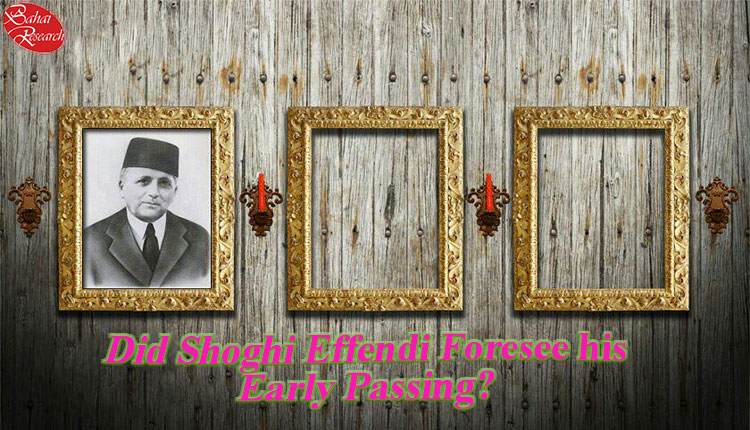Did Shoghi Effendi Foresee his Early Passing?
Did Shoghi Effendi Foresee his Early Passing?
Unequivocally and undeniably, yes!
Abstract
The imminence of Shoghi Effendi’s death is a question that can be identified with a little precision in the actions of Shoghi Effendi at the end of his life as the Guardian of the Cause of God. In this article, some of his important letters, his action in forming the embryonic House of Justice and the formation mechanism of the Baháʼí administrative organization have been discussed.
The question as to whether Shoghi Effendi had foreseen his early passing is asked by those Bahá’ís who, in their lack of faith in the indestructibility of the Covenant of Bahá’u’lláh and the immutability of the Will and Testament of ‘Abdu’l-Bahá, have inexcusably never taken the time or made the effort to search for an affirmative answer, which, otherwise, they would have been certain they would find, if they were to undertake a thorough review of the actions taken by Shoghi Effendi and particularly of the historic messages he had dispatched to the Bahá’í World during the latter years of his ministry. Had they retained an unwavering faith in the Covenant and complete assurance that Shoghi Effendi would have remained faithful to every clause of the Will and Testament of ‘Abdu’l-Bahá, their earnest search would have been rewarded and they would have not only unquestionably and conclusively found a clear and undeniable answer to this question but in the process have discovered, even more importantly, the identity of his successor and realized that he had chosen to obscure his identity at the time for the very reason that he had known that his passing was imminent and that it was essential that this frightful prospect be veiled from the believers (and so well, as it tragically turned out, that, upon his passing, the Bahá’í World, not only failed to recognize his successor but came to incredibly believe that the Guardianship of the Cause of God had come to a premature end).
On the other hand, their research need have gone no further than to read Shoghi Effendi’s message, dated 23 November 1951, issued some eleven months following the issuance of his one and only Proclamation of 9 January of the same year in which he had proclaimed in glowing and unprecedented terms his “historic decision marking the most significant milestone in the evolution of the Administrative Order” in constituting “at long last” the International Bahá’í Council—“this first embryonic International Institution”— (an initial and provisional designation in his projected four-fold stage of evolution of this embryonic Universal House of Justice). He had then subsequently and significantly identified, in his message of 2 March 1951, the identity of the permanent President thereof, the eminently distinguished believer, Mason Remey, whose exemplary devotion to the Covenant, and outstanding and unique record of manifold and unsurpassed services to the Cause of God for more than half a century had been repeatedly eulogized by ‘Abdu’l-Bahá during His ministry (as recorded and published at the time in The Star of the West).
All Bahá’ís are certainly still familiar with the fact that Shoghi Effendi had initiated a Ten Year Global Crusade that took place between Ridván 1953 and Ridvan 1963 in implementation of the Tablets of the Divine Plan of ‘Abdu’l-Bahá that involved establishment of the Faith throughout all virgin areas of the world and in which he had assigned specific goals for each of the existing National Spiritual Assemblies to achieve. Whereas the opening years of this Crusade would be carried out under the direction of Shoghi Effendi, himself, his message of 23 November 1951 cited above, significantly stated that this “Master Plan designed by ‘Abdu’l-Bahá will embrace all the continents of the earth, and will bring the Central body [i.e. the International Bahá’í Council] directing these widely ramified operations into direct contact with all the National Assemblies of the Bahá’í world . . . ” now, for the first time, an active role for this supreme body that had been previously retained, of necessity, in an inactively functioning status during the concluding years of Shoghi Effendi’s ministry, for the President of the Universal House of Justice, under the provisions of the Will and Testament of ‘Abdu’l-Bahá, even in its initial embryonic form, could be none other than the second Guardian-to-be (for as ‘Abdu’l-Bahá has affirmed: “the embryo possesses from the first all perfections . . . in one word, all the powers . . . ” (BWF p.313). With the International Bahá’í Council now performing this projected active role, Mason Remey would, as the President— “the sacred head”— of this embryonic Universal House of Justice appointed by Shoghi Effendi, automatically, unquestionably and rightfully inherit the Guardianship. Shoghi Effendi, therefore had clearly prophesied that his passing would take place during the period of the Ten-Year Global Crusade which, in fact, it did at midpoint, on 4 November 1957.
The further fact that in Shoghi Effendi’s appointment of a believer who was almost a quarter of a century older than himself, and notwithstanding was destined to become his successor is further definite evidence that he knew that his passing was near at hand.

Joel Bray Marangella
Australia
December 2008
Reference:

